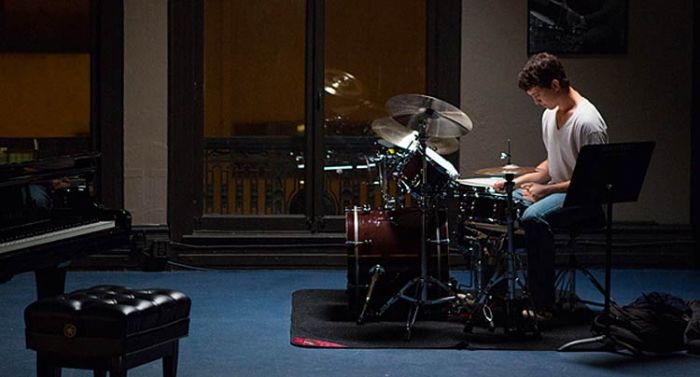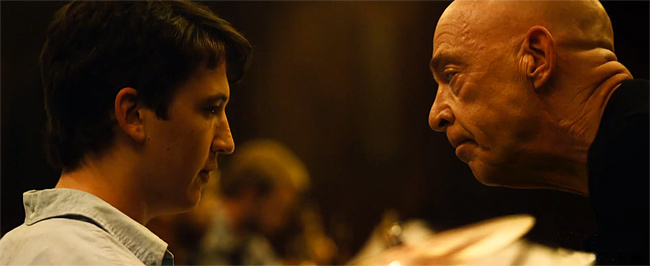Many movies have explored fame, but few really consider greatness. Fame is sort of an ancillary condition, a lucky consequence of timing. Greatness however comes from pushing yourself and your skills beyond previous limits. Usually when it comes to skill movies either preach the discovery of happiness via realigned expectations, such as in the excellent Bull Durham, or they take genius skill as an intrinsic quality, as in nearly every biopic ever made. Skill is treated like an essence, especially in musician biopics such as in Walk the Line where in Johnny Cash strums a hit after going to jail for five minutes. Often the process isn’t important, it’s the drama of whether their genius will be recognized and if their self-destructive urges will interfere. Whiplash switches the focus back to the process, with a minimalistic look at how the pursuit of greatness creates the drama. In this first big splash from director Damien Chazelle, we find out how close drive and psychosis truly are.
 |
| Practice makes pretty good |
The film focuses on a formative time in the life of aspiring jazz student Andrew (Miles Teller, continuing his dramatic evolution from teen movies). His first school years as a drummer at a prestigious conservatory mark the continuance of a childhood dream. To rise to the top he needs the attention of the college’s vicious top dog, a jazz conductor named Fletcher (JK Simmons) who catapults careers but rips everyone else to shreds. JK Simmons astounds as an overbearing volatile bully, a mentor who’s bipolar approach to excellence involves two soft spoken corrections and then instant acceleration to screaming. Despite Fletcher’s caustic personality, Andrew sees him as a necessary stepping stone in his career. To Andrew, Fletcher represents a bar he must clear if he is to really reach greatness, a necessary check on his skills. However Simmon’s Fletcher is not a simple perfectionist, and his brooding vindictiveness make success a constant moving target. In the beginning, Andrew treats Fletcher like a normal human being, only to be degraded minutes later in front of the band by something he shared in private. One must assume the path to greatness involves being insulted to your face.
 |
| Fun fact, google image search for whiplash mostly pulls up photos of Mickey Rourke in Iron Man 2 |
Although Fletcher is obviously toxic, Andrew’s view is complicated by what the approval of a man like this represents. Andrew has a nice supportive family, a budding relationship, and great competency as a jazz drummer, but he doesn’t find solace in these things. Instead, he completely buys into the idea that a truly great musician can win Fletcher’s approval. Whether he likes the man or not, Fletcher’s positive attention represents something meaningful to Andrew. This decision transforms Andrew throughout Whiplash, diminishing the naïve do-gooder attitude of a suburban kid and creating something much closer to Fletcher, a vindictive opinionated myope. Although big drama plays out later, the most telling scene is a small dinner table conversation tucked away in the front half of the movie. Andrew’s family is enjoying some success in the high school football, which Andrew can’t help but think is ridiculous. He’s unable to convince anyone there why his skill is more important, but he lays it all on the line saying he’d rather by dead and remembered for drumming at 35 than live to be 70. Even though he comes across as a jerk, damn can he drum. One of the interesting facets of the film is that it doesn’t seem to pick sides in this argument for very long. It is unclear if Fletcher’s tutelage is really helping Andrew.
 |
| I know I know, you’re going to get right to work on bettering yourself right after you finish reading this review |
The movie emphasizes this ambiguity by violently flipping the mood within scenes, hence the title Whiplash. Fletcher is a time bomb and Andrew’s attempts to keep up play out like a game of Red Light Green Light. During a practice we actually see the eponymous whiplash as Andrew physically writhes while trying to react. Simmons somehow maintains an even keel within Fletcher’s shit storms that make it hard to measure just how angry he is, and what his motivation is. And then, all the sudden, Fletcher will grow quiet and meditative, listening to a piece by a former student. Even this scene is reframed by the end of the film though. At first glance it seems like the ending submits a final answer, but it’s important to remember Fletcher’s justifications and Andrews alternative interpretation just a little before the coda. Everyone has a tendency to whitewash the idea of success down to some simple truisms; he succeeded because he was great and he wouldn’t have failed unless he wasn’t. Although Whiplash doesn’t present all of the complexities of life, it does suggest this kind of reductionism is a cover-up.
Whiplash is a spare film, but it maintains tension whenever Andrew and Fletcher are in the same room. The ancillary characters are weak here, but JK Simmons and Miles Teller perfectly capture a dysfunctional mentor relationship while forcing introspection on the audience. Why have we not yet accomplished great things in our jobs, our art, our lives? Is it because no one was driving us? Or, perhaps more frighteningly, we just didn’t care enough?
3/4
Originally published on Synthetic Error November 9, 2014

Comments
Post a Comment